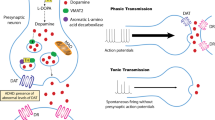Abstract
N-Methyl-d-aspartate (NMDA) antagonists induce psychotomimetic effects in humans that closely resemble negative and cognitive symptoms of schizophrenia. NMDA agonists, in contrast, may significantly ameliorate such symptoms. In rodents, phencyclidine (PCP) and other NMDA antagonists induce a hyperlocomotory syndrome that is reversed by NMDA agonists. The present study investigates the mechanism of action of glycyldodecylamide (GDA), a drug that is 80-fold more potent than glycine in reversing PCP-induced hyperactivity in rodents. At concentrations relevant to its behavioral actions, GDA significantly inhibits forebrain glycine uptake, indicating that glycine uptake inhibition may provide effective treatment for PCP psychosis and PCP psychosis-like symptoms of schizophrenia.
Similar content being viewed by others
Author information
Authors and Affiliations
Additional information
Received: 17 June 1996 / Final version: 16 September 1996
Rights and permissions
About this article
Cite this article
Javitt, D., Frusciante, M. Glycyldodecylamide, a phencyclidine behavioral antagonist, blocks cortical glycine uptake: implications for schizophrenia and substance abuse. Psychopharmacology 129, 96–98 (1997). https://doi.org/10.1007/s002130050168
Issue Date:
DOI: https://doi.org/10.1007/s002130050168




